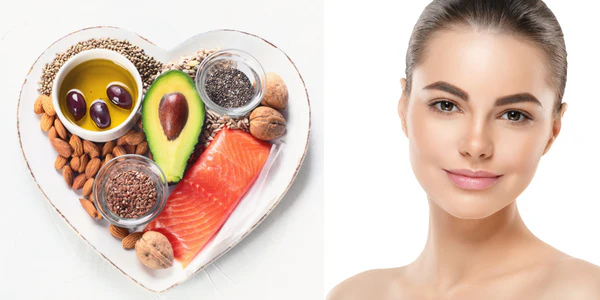Introduction
Foods for skin damage repair are essential for restoring healthy, glowing skin. While skincare products and treatments play a role, nutrition is the foundation of skin healing. The vitamins, antioxidants, and healthy fats found in certain foods can speed up recovery, reduce inflammation, and strengthen your skin barrier. In this article, we’ll explore the 10 best foods for skin repair, recommended by dermatologists and backed by science.
1. Fatty Fish (Salmon, Mackerel, Sardines)
Rich in omega-3 fatty acids, fatty fish help reduce inflammation, keep the skin moisturized, and promote faster healing. Omega-3s also protect against sun-induced damage.
2. Citrus Fruits (Oranges, Lemons, Grapefruits)
Citrus fruits are loaded with vitamin C, a powerful antioxidant that supports collagen production. Collagen is essential for repairing damaged skin and reducing scars.
3. Nuts & Seeds (Almonds, Sunflower Seeds, Chia Seeds)
These foods are excellent sources of vitamin E, which protects skin from oxidative stress, reduces dryness, and improves elasticity.
4. Leafy Greens (Spinach, Kale, Swiss Chard)
Dark leafy greens are packed with vitamins A, C, and K, plus antioxidants that fight free radicals and support natural skin renewal.
5. Avocados
Avocados provide healthy fats, vitamin E, and vitamin C—a perfect combination for repairing skin tissue and maintaining a smooth, hydrated complexion.
6. Berries (Blueberries, Strawberries, Blackberries)
Berries contain powerful antioxidants such as anthocyanins and polyphenols, which fight cell damage and speed up recovery from UV exposure.
7. Tomatoes
Tomatoes are rich in lycopene, an antioxidant proven to protect skin from sunburn and reduce long-term UV damage. Cooked tomatoes enhance lycopene absorption.
8. Green Tea
Green tea is high in catechins, compounds that improve blood flow, fight inflammation, and repair damaged skin cells caused by sun exposure or pollution.
9. Eggs
Eggs provide protein and biotin, both essential for building new skin cells and repairing the skin barrier. Protein is especially important for wound healing.
10. Sweet Potatoes
A great source of beta-carotene, which the body converts into vitamin A. This nutrient strengthens the skin barrier and protects against dryness and sun damage.
Lifestyle Tips to Support Skin Repair
While food is the foundation of healthy skin, certain lifestyle habits can boost recovery:
-
Drink plenty of water to stay hydrated.
-
Sleep 7–8 hours daily to allow overnight skin repair.
-
Reduce sugar and processed foods that trigger inflammation.
-
Manage stress through relaxation or exercise.
-
Protect your skin daily with sunscreen.
-
Stick to a simple skincare routine with gentle products.
Read also: Skin Barrier Repair: What Really Works (7 Proven Methods)
1. Why These Foods Help Skin Repair
-
Omega-3 fatty acids (from fish) reduce inflammation at the cellular level.
-
Vitamin C boosts collagen, essential for wound healing.
-
Vitamin E protects against oxidative stress, slowing down aging.
-
Beta-carotene (sweet potatoes) converts into Vitamin A, crucial for barrier repair.
-
Polyphenols (green tea, berries) fight free radicals and protect DNA from UV damage.
2. Sample 1-Day Skin Repair Meal Plan
-
Breakfast: Green tea + scrambled eggs with spinach.
-
Lunch: Grilled salmon with avocado salad.
-
Snack: A handful of almonds and blueberries.
-
Dinner: Sweet potato with steamed kale and a citrus fruit smoothie.
Conclusion
Healing damaged skin isn’t just about creams and treatments—it starts from within. By including these 10 best foods for skin damage repair in your daily meals, you’ll give your skin the nutrients it needs to recover, regenerate, and glow. Pairing these foods with healthy lifestyle habits—like proper sleep, stress management, and hydration—ensures not only faster skin recovery but also long-term results and a radiant complexion.
External References
This article is presented by SkinDamageRepair.com, your trusted source for expert skincare tips, treatments, and natural remedies to heal and protect your skin.




